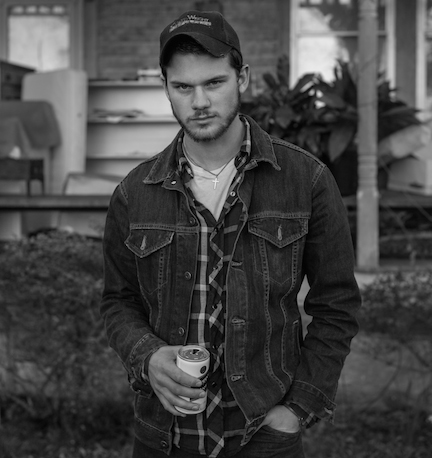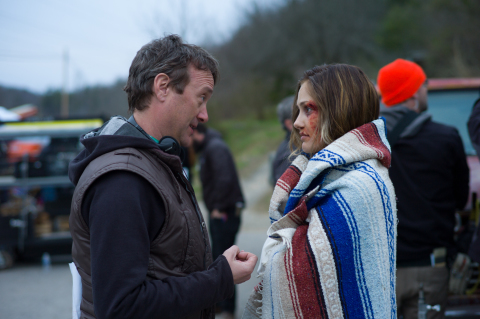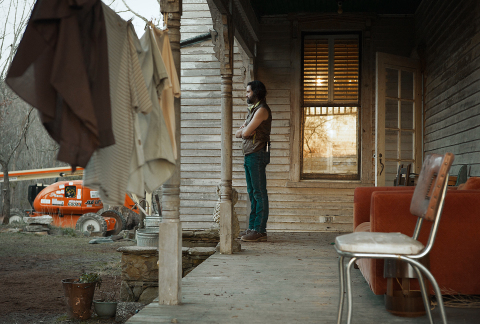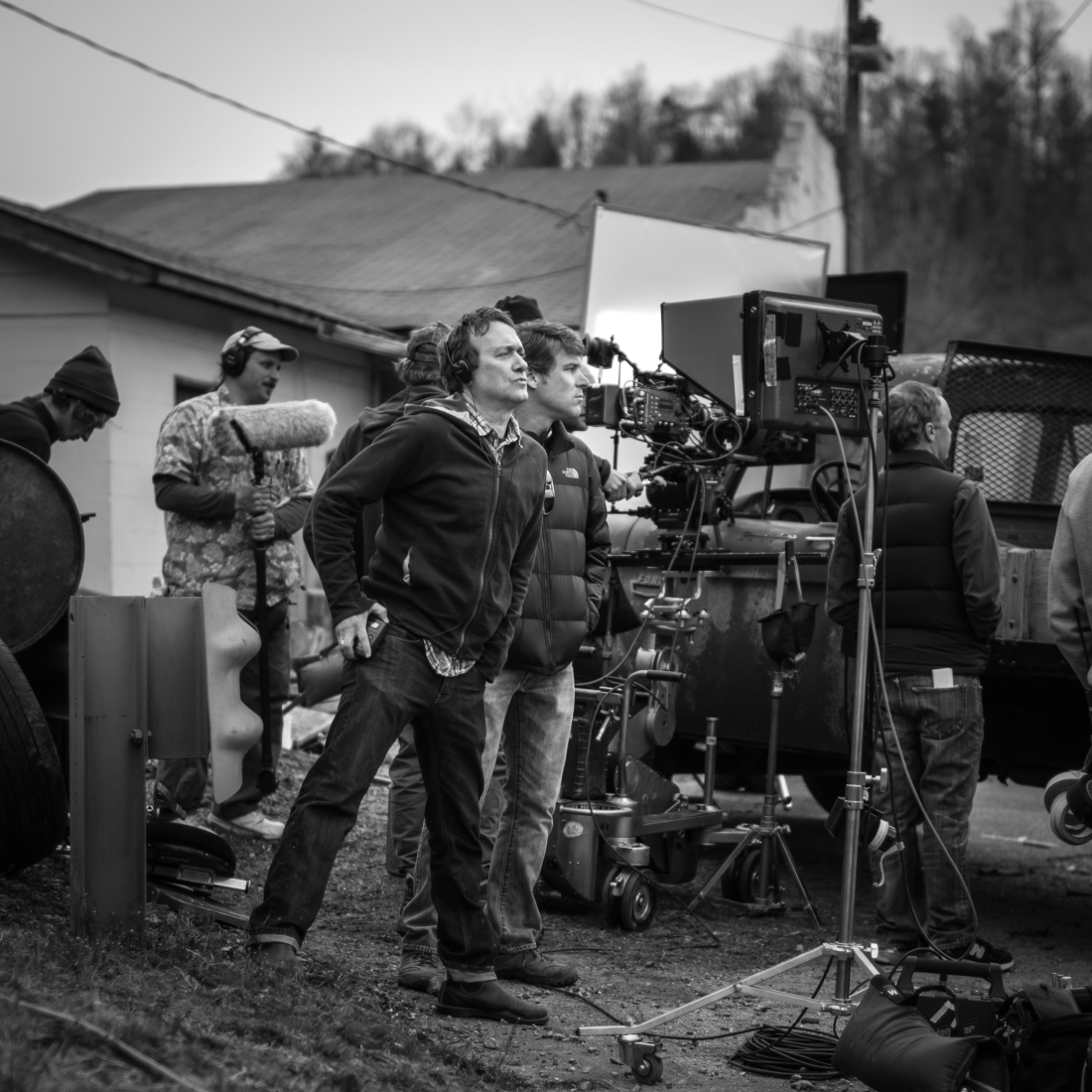“When I write, I don’t think, ‘This could be a good plot for a movie,’” says Western North Carolina-based writer Ron Rash. “I was very surprised when one person thought, ‘I’d like to try to make this into a movie,’ much less two.”
But that’s exactly what happened: two of Rash’s novels, Serena and The World Made Straight, were optioned for motion pictures. Both are set in WNC. And despite very different crews, budgets and schedules, the two films are set for U.S. releases within six weeks of each other.
Serena, which stars Jennifer Lawrence and Bradley Cooper, was filmed in the Czech Republic. (Similarly, Civil War drama Cold Mountain, from the book by local author Charles Frazier, was filmed mostly in Romania.) The World Made Straight, however, was a North Carolina production through and through, down to — and because of — its directors.
Native ground
“That was the grand plan,” says David Burris. He and producing partner Michael Wrenn attended high school together in Raleigh. Both went into film and TV careers. They met in New Zealand when Burris was on the way back to the U.S. following a “Survivor” shoot in the South Pacific — he worked as a producer on that reality series for 18 seasons — and discussed doing a project together. “We said, ‘let’s resolve to make a film set in North Carolina, about North Carolina, using as many North Carolina people as we can,’” says Burris.
And, despite his frustration about the current lack of tax incentives in this state (“This is the time that the money, the productions and the creativity are getting spread around and flowing out of California,” Burris says. “There’s no reason why North Carolina shouldn’t be able to grab a piece of that pie.”), that’s exactly what he and Wren made happen.

The World Made Straight weaves a ’70s-era storyline with scenes from a Civil War massacre that took place at Shelton Laurel in Madison County. High school dropout Travis is taken in by former teacher-turned-drug dealer Leonard, who hopes to help Travis escape both the family that keeps him down and a local farmer/drug dealer who’s out to get the teen. But a shared history dating back to the massacre sets Travis and Leonard at odds. It’s a dark story, though Rash says, “I’m not a cynical writer. I put my characters in tough situations, but very often they’re admirable and they do the best they can.”
He adds, “I went to the gravesite, and I went to the massacre site, and they really do feel like haunted places. I realize I’m bringing something to it, but there’s an intense feeling there.”
In making the big-screen version of Rash’s story, Burris also sought out those eerie settings. During the filming, he says, the cast had multiple semisupernatural encounters. At Shelton Laurel with Jeremy Irvine (who plays Travis) and Noah Wyle (Leonard), they came across an old barn. In it, “There was a truck bed cover, and the brand was Leonard,” Burris remembers. “When we shot in downtown Marshall, it was a nasty, creepy day. Everyone was having weird feelings already. Then we turned around and we were right in front of Lawrence Allen’s house.” The Confederate colonel’s residence was looted in the events leading up to the Shelton Laurel massacre.
Burris stands behind the personal sense of romanticism that drove him, Wren and fellow lead producer Todd Labarowski — another North Carolinian — to film around Buncombe, Madison and Henderson counties. “The type of atmosphere it creates for the actors and the crew, psychologically, creatively and emotionally, to know you’re performing on the actual ground where the story took place and where the events that inspired the story took place — that’s immeasurable,” he says. They could have kept the project in-state but worked closer to international airports, making it easier to bring in personnel, but “we were bound and determined to keep working at the budget and keep working at our schedule to make sure we could do it,” says Burris. “We were all obnoxious about making sure it worked out that way.”
He adds, “It all really boils down to that patch of earth.”
Sounds familiar
As much as the inspiration for The World Made Straight came from Madison County (and Serena from the land around Waynesville), Rash says that the source of his craft remains a mystery. “I don’t know where the stories come from. Obviously, sometimes I’ve done research in a particular area, or I’m interested in something,” he says. “But ultimately the characters and the voices — I don’t know how it happens, I’m just glad when it does.”
Still, those voices come complete with accents, and the one from WNC is distinct from other Southern drawls. “He really did a good job with the accents,” the author says of Burris. “The Appalachian accent — people so rarely get it right.”

The director points out that Irvine — from Cambridge, England — is “actually very English” but “has an unbelievable talent for accents. He’s like a 24-year-old Meryl Streep.” That, and “the area was a crossroads for trade routes, so it’s a bit of a mishmash” as far as linguistic influences, Burris says. That mashup of cadences and inflections makes the speaking style harder to get exactly right but also allowed the actors some leeway.
Rash, who hadn’t seen either film at press time (“I stay away from it because, in part, it’s their vision now”), noted that Burris had paid attention to a number of small details such as the use of WNC-accurate Plott hounds. And there’s more than an artistic respect between author and filmmaker: “Our families have known each other,” Rash says. “It’s a nice thing to reconnect later in life — that’s something that makes this special.”
But accents alone don’t complete the soundscape. Burris reached out to Durham-based psych-folk band Megafaun for the score. “When we were starting to do the screenplay, somebody sent me their record, Gather, Form & Fly,” he says. “There were three or four songs on that record that were indelibly burned on my brain as being the right soundtrack for this film.” The producer, a musician himself (he plays guitar in The Veldt), keeps up with the North Carolina music scene by attending Hopscotch Music Festival each year. He tapped other friends to add tracks to the film: Darren Jessee (of Ben Folds Five) contributed a song with his band, Hotel Lights. The Holland Brothers (of Jennyanykind) and The Connells are also on the soundtrack.
Storytime
There’s another important musical connection, though this one is not about WNC. Sharing space on the cast list, along with Minka Kelly and Haley Joel Osment, is alt-country artist Steve Earle. The singer-songwriter plays Carlton, a scoundrel, and was chosen both for his ability as a vocalist (the character not only farms marijuana but, as local mystery writer Vicki Lane puts it, “sings gospel with an angel’s voice”) and his acting style.
“I was watching ‘The Wire’ and ‘Treme,’ as we were getting the script together,” says Burris. In both shows, Earle played a teacher-type character. “There was a warmth and a kindness he was able to get across on screen very easily,” says Burris. “I thought that warm, mentoring aspect of his character, inhabiting a villain whose deeds and actions were so sociopathic, would make the character creepier than going for an arch bad guy.”

Plus Earle, who grew up in Virginia and spent a large part of his career in Texas, relates to the South. But Burris — along with Wren and Labarowski — really homed in on the area surrounding Asheville. “The movie would not have been nearly so good if we hadn’t had so many local crew,” the director says. “They knew the area, and we were able to use them as resources for authenticity of wardrobe and what kind of cars these characters would have been driving.”
He adds, “I wanted people to be as emotionally connected to it as possible.”
That goes for viewers as well, because as much as the film is about Rash’s story, it’s also about the region. “The light and the natural diffusion up in that part of the state is gorgeous for film,” says Burris. One director of photography told him, “Ron [Rash] writes with light. Ron writes in a very cinematic way. He almost gives you cues for how you’re going to set up a scene, in regard to cinematography.”
Rash, however, has no intention of breaking into Hollywood. “It will always be about sitting down and trying to get the next sentence right,” he says. “That doesn’t change. I’ve spent so many years trying to learn how to write stories and novels. That’s what I do best, and that’s what I’ll continue to do.”
The author has a new novel in the works. It’s contemporary and set in WNC and, he says, “In some ways I feel like this is my most optimistic book.”
Meanwhile, Burris is purchasing his parents’ house in Raleigh as a part-time residence for himself, and he’s optioned the novel Doubles by North Carolina native Nic Brown. “There’s something special about the South in general and North Carolina specifically — our knack for storytelling and our love of storytelling,” he says. Film “brings the literary, the visual and the musical all together. It seems like the ultimate form for being able to tell a story.”



Love this area !! Keep the news coming !